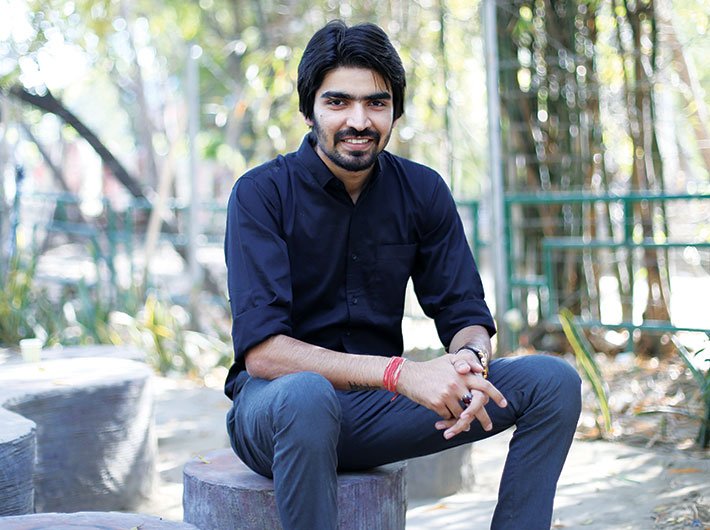As a seventh grader participating in a painting competition in his school in Noida, he had drawn two flags inside the triangular halves of a kite – the tricolor representing India and the green-white crescent-star of Pakistan over a decade ago. The painting had a catchy caption: ‘Stop war, spread peace.’ This was adjudged as the best entry and awarded the first prize.
The then 13-year-old’s first perception of Indo-Pak relationship continued to define his sense of nationalism till he joined Akhil Bharatiya Vidyarthi Parishad (ABVP) and shot to fame for leading the students of Delhi University (DU). After narrating his fond memory from his schooldays, Satender Awana returns to the present day scene on the DU campus – a battleground for the conflicting ideas of Left and Right wing student organisations on nationalism. Awana, a former president of the Delhi University Students Union (DUSU), had been leading protests against Ramjas College authorities for inviting Jawaharlal Nehru University (JNU) student leaders Umar Khalid and Shehla Rashid for a seminar. ABVP was dead against the presence of Khalid as a speaker in the seminar, since he has not been cleared of the sedition charges slapped on him last year. The college eventually withdrew the invite to both Khalid and Rashid, which led to protests by the other side and clashes between rival students’ groups in the campus. As the ruckus continues, ABVP stands accused of unleashing violence and throttling the freedom of speech. It has revived the debate on nationalism, once again.
Meeting Awana for a one-to-one conversation was not easy. He has the reputation of being flaky, and often hard to locate. Lalit Tanwar, an ABVP member and Awana’s friend, says, “He’s a famous personality. A lot of people, especially from villages, invite him to their programmes. He doesn’t always make it, but in that case, he makes it a point to go and personally meet the organisers to explain why he couldn’t come.”
I meet him in the DUSU office, in the North campus of the university. Awana is apologetic for repeatedly postponing this meet. The rangy student leader, wearing a creaseless black formal shirt, insists on having tea served for everyone. It’s evident that he enjoys clout and command in the DUSU office from the way he speaks to his fellows. Leaning back on the sofa, he appears to be at ease, shows no sign of hostility and has the air of a seasoned politician.
“As a young boy, whenever I saw people cheering for our victory over Pakistan in a cricket match, I always felt that whether they win or we do, it doesn’t really matter,” he says. “I used to think that they’ve been our people. What’s the joy in defeating our own people?” From calling citizens of a different country “our people” to leading a party known for its rigid nationalistic stance, Awana has come a long way.
“Any ideology that goes against nationalism can never be successful in the world. Sab se upar uthkar hai desh! (The nation is above everything else),” he declares didactically.
Awana admits that the ABVP has played a crucial role in changing his personality and thinking. He joined the party in 2011, after being elected vice-president of Shaheed Bhagat Singh College in DU. “In my initial days, I had attended meetings of both NSUI and ABVP. In the NSUI meetings, the focus was always on sycophancy of the leaders. In ABVP, they would inspire you to work for the country. Patriotism is crucial to the foundation of ABVP – that’s the first thing we talk about. They also talk about knowledge, character and unity, the three essentials for development of a human being. The organisation teaches you that your kathani (speech) has to be in tandem with your karani (actions). This is what really impressed me,” he says.
His love for Pakistani ‘brothers’ tapered off as he began feeling that the people from across the border do not reciprocate the friendly vibes from India. “I got a sense of reality after joining ABVP. That doesn’t mean that we were instigated against Muslims or Pakistan or any particular community. I just realised that the provocation has always come from the other side. They were our people – but are not anymore.”
Awana is not new to politics. His father, Rishi Pal Gujjar, is a senior leader of the Akhilesh Yadav-led Samajwadi Party (SP). After joining ABVP, Awana started talking to his father about the ideological positioning of the two parties. “I started telling my father that SP is an individualistic party. It plays dynasty politics. However, in BJP, anyone can stand up and lead, provided they have enough work experience and dedication.” Awana jests that his father might be feeling isolated during the family discussions on politics, since the rest of the members of his family have shifted loyalty to the BJP.
“Jokes apart, I respect my father and some of the leaders from the other political parties as well. But I wouldn’t align myself with their ideology,” he says.
Satender’s father wants him to become a lawyer and not to get into politics. The rest of the family, however, is in awe of the young leader. Nishi Awana, wife of Awana’s elder brother, has nicknamed him ‘little Modi’. “I think he has clear thoughts; is extremely dedicated towards his work, and is organised as well. He has the capability to achieve what he wants. Let’s see what future holds for him,” she says.
Awana recalls how his late grandfather’s public life had influenced him in his childhood. He has tattooed his grandfather’s first name ‘Bhishma’ on his wrist in an English font mimicking the Devanagari script.
“He was the sarpanch of our village Harola. As a kid, I used to sit with my grandfather for the panchayat meetings; I would listen carefully to the verdicts he would deliver. Subconsciously, I was learning from what he spoke. I could understand the meaning and importance of justice from his talks. When I contested election in my college, all that I learnt then was of great help to me. I realised from where I had learnt to speak in public, from where I had got the sense of what to say and how to lead,” says Awana.
One thing about him that worries his family and friends alike is his tendency to lose his temper and to get aggressive. Awana has been accused of threatening journalists, students and teachers during and before the recent protests in the campus. A video, in which Awana was seen shouting at the dean of the law faculty, had gone viral online. “Nahi hoon mai student! Badtameez hoon! (I am not a student, Yes I am an uncouth fellow),” he is seen telling the dean in the video.
Awana is unapologetic for his public outburst of anger. He feels only an honest man can lose his temper. However, he refutes the allegations of getting violent and abusive towards journalists, students and teachers on the campus.
“Do you find me aggressive?” he asks with a broad smile.
It is clear that Awana has become the talk of the town in the university. A member of the Congress-affiliated NSUI who does not wish to be named says, “Aawana’s confidence is his strength, but he doesn’t realise when it turns into his arrogance. Simple workers from ABVP find him uptight, sometimes, and maintain their distance from him. Gaali galoch ka bhi bada problem hai (He often gets into showering abuses on people).” However, he feels that Awana is extremely loyal to the ABVP, and most of the fights he picks are not personal but are for defending his organisation.
Priyanka Chhawri, ABVP member and vice president of DUSU, defends Awana. “He is an extremely gentle and intelligent person and he always stands for what is right. I have worked closely with him, and I can tell you that all these allegations are completely false.” She also feels that Awana is sentimental and tends to get emotionally involved in students’ issues.
Awana sits upright and uses hand gestures profusely when he speaks about Leftist organisations. “Yeh to meetha zeher hai (They are a sweet poison),” he says. “They are responsible for giving rise to intellectual terrorism in the country. Look at their ideology. All communist countries have suffered from dictatorships. Have any of them benefited from it? They appease the minority and use caste to divide people. Why do they shout slogans like ‘Kashmir maange azaadi’? This is such a sensitive topic for us, and they expect that there will be no reaction to (slogans like) ‘Afzal Guru hum sharminda hain, tere kaatil zinda hain’.”
Awana says he will continue to work for ABVP as long as its ideology remains the same. “I don’t want to be a person who jumps from a party to another just for the greed of an election ticket. I’ll be loyal to my party. Maybe, in future, if the new generation comes and has a different ideology and their thinking doesn’t match with ours, we’ll go our separate ways.”
Awana, however, wants to finish his law degree first. “I have always wanted to pursue law, and I’ll finish it. I don’t know if I’ll end up in politics or I’ll become a lawyer; either ways, I’ll use my knowledge and resources only to serve the people of India, and help make it a better country,” he says.
pranita@governancenow.com
(The story appears in the March 16-31, 2017 issue of Governance Now)

